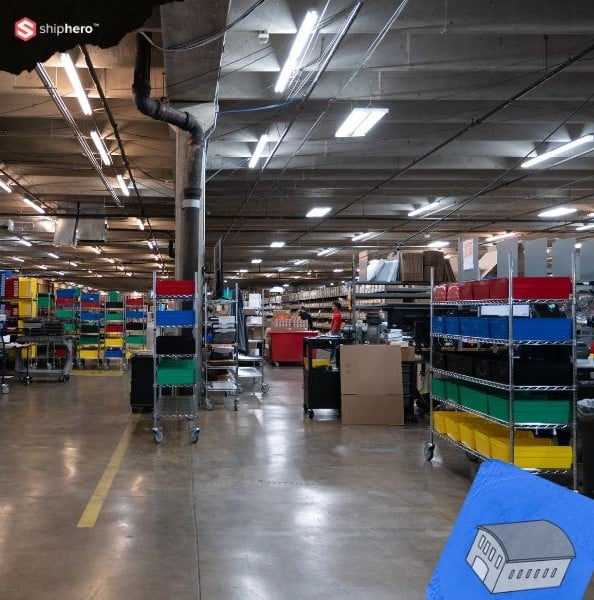
B2B Fulfillment and Shipping: How It Works
B2B fulfillment and shipping are crucial aspects of modern business. This article explores the ins, outs, and benefits of B2B fulfillment, key differences between B2B and B2C order fulfillment, and how the process works. It also discusses what to look for in a B2B order fulfillment service and ways to improve the B2B fulfillment process—so let’s dive in!
What is B2B Fulfillment?
B2B (business-to-business) fulfillment refers to the process of receiving, processing, and shipping orders from one business to another. Unlike B2C fulfillment, where businesses ship products directly to consumers, B2B fulfillment focuses on meeting the needs of other businesses.
In B2B fulfillment, the scale of operations is usually larger than in B2C, as businesses tend to place bulk orders. This type of fulfillment requires careful coordination between suppliers, manufacturers, distributors, and retailers to ensure smooth and timely delivery of products.
Several key players are involved in the process. Let’s take a closer look at each of them:
- Suppliers: Suppliers play a crucial role in B2B fulfillment as they provide the products or materials that make up the orders. They may be manufacturers, wholesalers, or distributors who supply goods to other businesses.
- Manufacturers: Manufacturers are involved in the production of goods. They transform raw materials into finished products, which are then supplied to businesses through fulfillment.
- Distributors: Distributors act as intermediaries between manufacturers and retailers. They help distribute and store products, ensuring that they reach the intended businesses in a timely manner.
- Retailers: Retailers are the businesses that sell products directly to end consumers. In the B2B fulfillment process, retailers may act as buyers, placing orders with suppliers or manufacturers to replenish their inventory.
Efficient B2B fulfillment requires effective communication and collaboration among these key players. For example, when a business places an order with a supplier, the supplier needs to communicate the order details to the manufacturer, who then produces the required goods.
The distributor ensures that the products are stored and transported to the retailer, who ultimately delivers them to the end consumer.
Another important aspect of B2B fulfillment is inventory management. Businesses need to carefully track their inventory levels to ensure they have enough stock to fulfill orders. This involves implementing inventory management systems, conducting regular audits, and forecasting demand to avoid stockouts or overstocking.
B2B fulfillment also often involves additional services beyond just shipping products. Businesses may offer value-added services such as customization, kitting/bundling, or assembly, depending on the specific needs of their B2B customers.
B2B fulfillment isa vital aspect of the business ecosystem that helps businesses to meet the demands of other businesses and drive economic growth.
Effective inventory management is pivotal in avoiding stockouts and overstocking. Dive into our comprehensive guide on ecommerce order management software to discover tools that can provide real-time visibility and control over your inventory, ensuring a smooth and reliable fulfillment process.
Benefits of B2B Fulfillment Services
B2B fulfillment services offer your business several benefits. Firstly, outsourcing fulfillment lets you focus on other core aspects of your business, like product development and marketing.
With the burden of fulfillment lifted, you can concentrate on growing your business and achieving your long-term goals.
Secondly, B2B fulfillment services often have well-established networks and partnerships with shipping carriers that can lower shipping costs and speed up delivery times. These partnerships let B2B fulfillment providers negotiate competitive shipping rates and pass the savings on to their clients.
Furthermore, their strong relationships with shipping carriers open up expedited shipping options. This enhances customer satisfaction and keeps you ahead of the competition.
In addition to cost savings and faster delivery, B2B fulfillment services offer the expertise to streamline complex logistics, optimize your fulfillment processes, and maximize efficiency.
From order processing and inventory management to packaging and shipping, B2B fulfillment providers have the necessary infrastructure and experience to handle every aspect of the fulfillment process. By leveraging their expertise, you can minimize errors, reduce order processing time, and improve overall customer satisfaction.
Moreover, B2B fulfillment providers typically have warehouses equipped with advanced inventory management systems. These systems enable real-time stock level tracking, minimize stockout risk, and improve order accuracy.
In conclusion, utilizing B2B fulfillment services can bring numerous benefits to your business. From allowing you to focus on core aspects of your business to leveraging cost savings and expertise in logistics, partnering with a B2B fulfillment provider can help you streamline your operations and enhance customer satisfaction. By entrusting your order fulfillment to professionals, you can position your business for growth and success in the competitive B2B landscape.
While B2B fulfillment caters to the needs of businesses, understanding the nuances of Direct to Consumer fulfillment can offer valuable insights into enhancing customer experiences even in a B2B model. Discover how blending elements from DTC fulfillment strategies can improve efficiency and customer satisfaction in B2B transactions.
Key Differences Between B2B and B2C Order Fulfillment
While B2B and B2C order fulfillment share some similarities, there are key differences that businesses need to be aware of.
One major difference is the order volume. B2B orders are often larger in quantity and value compared to B2C orders. This requires a different approach to inventory management and order processing.
Another difference lies in customer expectations. B2B customers usually expect personalized services, tailored pricing, and reliable delivery schedules. Meeting these expectations requires efficient communication and strong customer relationship management.
Lastly, the complexity of B2B fulfillment is often higher due to factors like order customization, multiple shipping locations, and special packaging requirements. B2B fulfillment providers need the infrastructure and capabilities to handle these complexities.
How does the B2B Fulfillment Process Work?
The B2B fulfillment process involves several key steps.
Once the orders are received, they are processed and entered into the fulfillment system. This includes checking inventory levels, verifying payment, and ensuring order accuracy.
Next, the products are picked from the warehouse shelves or manufacturing facility and prepared for shipment. They’re packaged securely and labeled appropriately.
The packages are then handed over to the shipping carrier for delivery. The B2B fulfillment provider tracks the shipment and provides updates to both the business and the customer.
Upon delivery, the customer inspects the products and confirms receipt. The B2B fulfillment provider’s customer service team handles any issues or returns.
What to Look for in a B2B Order Fulfillment Service
When choosing a B2B order fulfillment service, there are several factors to consider.
Firstly, assess their track record and experience in handling B2B fulfillment. Look for case studies or testimonials from existing clients to gauge their reliability and performance.
Secondly, evaluate their technology infrastructure. A modern and robust fulfillment system can streamline operations, improve efficiency, and provide real-time visibility into order and inventory status.
Additionally, consider their warehousing and distribution capabilities. Do they have strategically located warehouses that can reach your customers in a timely manner? Are their warehouses equipped with advanced inventory management technology?
Lastly, evaluate their customer service and communication channels. A responsive and proactive team can help resolve issues quickly and keep your customers satisfied.
Ways to Improve the B2B Fulfillment Process
To enhance the B2B fulfillment process, consider implementing the following strategies:
- Automate order processing: Use technology to streamline order processing, reduce manual errors, and improve efficiency. Automating the order processing and optimizing shipping are key to improving B2B fulfillment efficiency. Learn about the role of ecommerce shipping software in streamlining these processes, offering scalable solutions that adapt to your business needs.
- Implement inventory management systems: Onboard inventory management software to optimize stock levels, prevent stockouts, and improve order accuracy.
- Optimize packaging and shipping: Invest in packaging materials that protect products during transit and work closely with shipping carriers to negotiate favorable rates.
- Focus on customer satisfaction: Provide exceptional customer service, communicate transparently, and proactively address any issues that arise.
- Continuously monitor and analyze performance: Use key performance indicators (KPIs) to measure and improve all aspects of your fulfillment process and the customer experience.
Key Takeaways
In conclusion, B2B fulfillment and shipping is a complex yet crucial process for businesses. Outsourcing to a reliable B2B fulfillment service can bring numerous benefits, such as improved efficiency, lower shipping costs, and enhanced customer satisfaction.
Remember that B2B fulfillment differs from B2C fulfillment in terms of order volume, customer expectations, and complexity. Understanding these differences is vital to ensuring a smooth fulfillment process.
When selecting a B2B order fulfillment service, consider factors like track record, technology infrastructure, warehousing capabilities, and customer service.
To improve the B2B fulfillment process, focus on automation, inventory management, packaging optimization, customer satisfaction, and performance monitoring.
Frequently Asked Questions
What is the difference between B2B and B2C fulfillment?
B2B fulfillment focuses on shipping orders between businesses, typically involving larger quantities and personalized services. B2C fulfillment, on the other hand, caters to individual consumers and smaller order sizes.
Can I handle B2B fulfillment in-house?
Yes, you can handle B2B fulfillment in-house, but it requires significant resources, expertise, and infrastructure. Outsourcing to a specialized B2B fulfillment service is often more cost-effective and efficient.
How can B2B fulfillment services help improve my supply chain?
B2B fulfillment services can optimize your supply chain by providing advanced inventory management, efficient order processing, strategic warehousing, and reliable shipping partnerships. This can lead to lower costs, quicker delivery times, and better customer experience.
Is B2B fulfillment only for large businesses?
No, businesses of all sizes can benefit from B2B fulfillment services. Even small and medium-sized enterprises can leverage the expertise and infrastructure of fulfillment providers to compete effectively in the B2B market.

